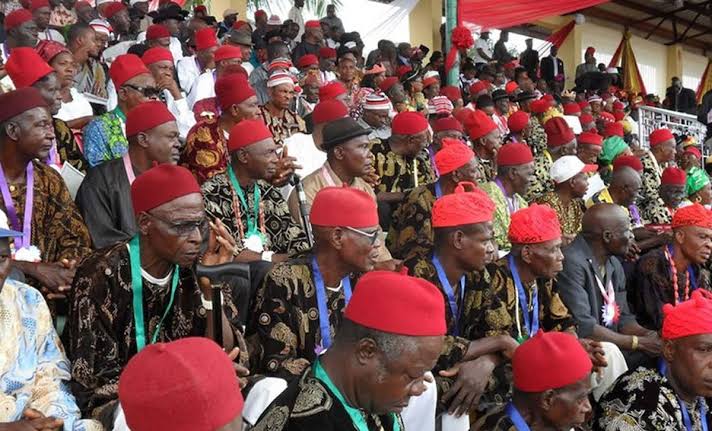2023 presidency and the problem of Igbo unity

By Dons Eze, PhD
The contending issue at the moment is that the Igbo are not united. The noise is all over the place, that the Igbo are not speaking with one voice, but in cacophony of voices, and therefore are not coming together to pursue a common goal.
A ready example is the present quest for Igbo Presidency in 2023, where one thousand and one Igbo people are already in the field jostling for recognition. For many people therefore, the fear is that this could spoil the Igbo cause and make other ethnic groups to change their minds from conceding the Presidency to the Igbo in 2023.
While that fear may be genuine, which may need Igbo leaders to put their heads together and brainstorm on how to deal with the problem, we however should not lose sight on the nature and character of the Igbo who are known to be free-minded and audacious in action. The Igbo naturally do not accept to play any subservient role. They are risk takers, who together with their “can do” spirit, believe no task to be too difficult or unsormountable.
The Igbo will look you in the face and tell you: “Esi be gi eje be onye?” (Does your house lead to anybody’s house?”, not necessarily to denigrate or to undermine your integrity, but to let you know that he is capable of doing whatever any other person can do. Perhaps, that may be the reason for the popular aphorism of “Igbo enwe Eze” (the Igbo have no king).
But the Igbo have king, according to Professor Cyril Onwumechili, who equated the Igbo kingship system to participants in a scientific seminar, where each participant would come in with his own idea, but at the end of the seminar, all would arrive at the same conclusion.
Thus, the Igbo king is not divinely ordained. He is not a ready-made product. He is an ordinary human being who, through struggles and hardwork, will walk himself up the top of the pyramid, and thereby entrenches himself in the hearts of the people. He then will be accepted, respected, and honoured as a leader, as a king.
Dr. Nnamdi Azikiwe was possibly not the first Igbo graduate, nor was he the wealthiest Igbo man during his time. But he worked so hard to outshine many people before him, as well as his contemporaries, to earn the respect and admiration of Igbo people, who subsequently acknowledged him as their leader.
The same thing could be said of Dr. Michael Okpara, former Premier of defunct Eastern Region, and Dim Chukwuemeka Odumegwu-Ojukwu, leader of the defunct Republic of Biafra. They all capitalized on the circumstances or the situations prevalent at their times to entrench themselves in the hearts of the people, and thus became Igbo leaders.
During the Abacha Constitutional Conference of 1996, Dr. Alex Ekwueme worked hard through his excellent presentations at the conference, to merit the respect of his fellow Igbo conferees, who later acknowledged him as their leader. Ekwueme never imposed himself on them. It happened as a result of hardwork.
Therefore, those Igbo sons and daughters currently jostling to be President of Nigeria in 2023 are not necessarily distracting from the Igbo cause, provided that each of them is sincere and honest. In a democracy, and particularly for the republican Igbo, nobody expects everybody to sing the same tune. It has never happened anywhere before, nor is it likely to happen now.
During the Second Republic, there were more than six politicians from Nothern Nigeria who sought to be President on the NPN ticket, but at the end of the day, it was Alhaji Shehu Shagari that was picked. Aminu Kano left and formed the PRP, Ibrahim Waziri formed the GNPP. But Adamu Ciroma, Shinkafi, etc., remained with the NPN.
In 1999, Olusegun Obasanjo, Olu Falae, and Bola Ige, all Yoruba sons, showed interest to become President of Nigeria. That did not stop the Presidency to be zoned to the South West, which tickets were picked by Obasanjo and Olu Falae for their respective political parties.
In 2007, Umaru Yar’Adua and Muhammadu Buhari were from the same state of Katsina, and yet both of them contested the Presidency of Nigeria. Right now, two Yoruba sons, former Lagos Governor and APC national leader, Bola Tinubu, and Ekiti State Governor, Kayode Fayemi, are sizing each other ahead of 2023 election.
So, we do not see anything wrong or unsual, if every Igbo politician who feels that he has the capacity and requisite qualifications to contest for the Presidency in 2023 decides to test the waters, provided that such a politician is not dancing another person’s music. What is important is for each of these political aspirants to be focused, keep eyes on the ball, and ensure that within his own political party, the Presidency is zoned to Igbo land.

